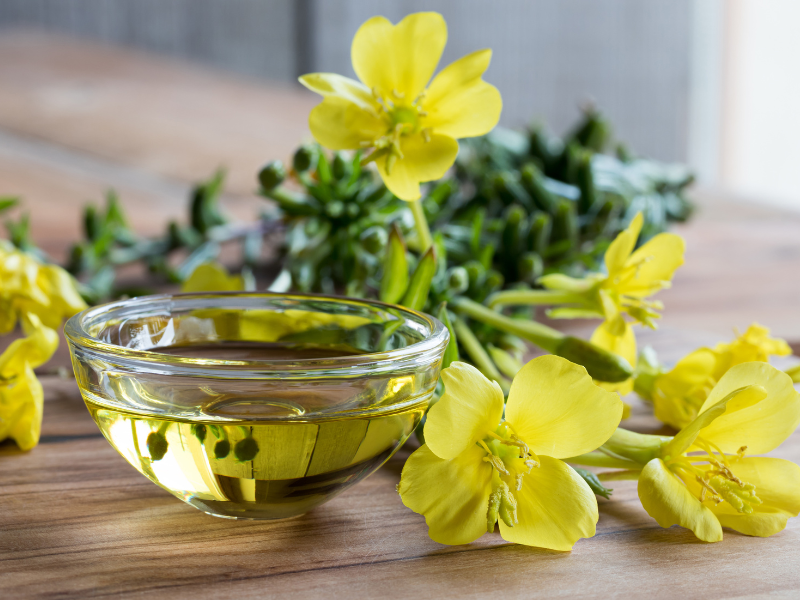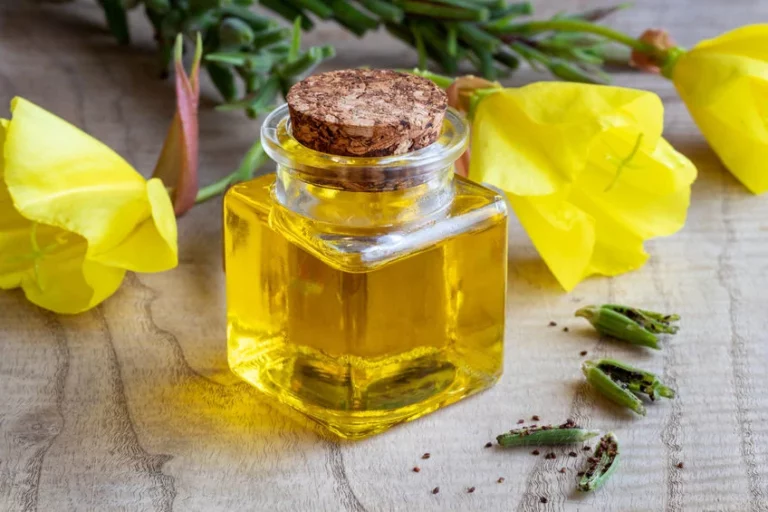Evening Primrose Oil (EPO), often dubbed “King’s cure-all,” is an extraordinary supplement distilled from the tiny, nutrient-rich seeds of the Oenothera biennis plant. This flowering beauty, with its large yellow blossoms that unfurl under the evening sky, is celebrated for its remarkable health benefits. EPO has been a staple in traditional medicine for centuries, particularly revered for its ability to address various skin ailments such as eczema, alleviate menopausal symptoms, and tackle other health issues. This article delves into the scientifically supported advantages of evening primrose oil, exploring its diverse uses, appropriate dosages, and important safety considerations. Unlock the secrets of Evening Primrose Oil for anti-aging, acne treatment, and more benefits.
Origins and Characteristics of Evening Primrose Oil
The evening primrose plant is native to the rich soils of North and South America but has also found a home across the landscapes of Europe and Asia. Known for its striking yellow flowers blooming at dusk, the plant bears tiny seeds pressed to yield EPO. This golden oil is abundant in gamma-linolenic acid (GLA) and linoleic acid—essential fatty acids celebrated for their potent anti-inflammatory properties and various health-enhancing attributes.
Health Benefits of Evening Primrose Oil

Relief for Eczema Symptoms
EPO has become an effective remedy for managing eczema (atopic dermatitis), which is marked by itchy, inflamed skin. The anti-inflammatory action of EPO is attributed to its rich fatty acid content, which aids in restoring levels of prostaglandin E1—an anti-inflammatory compound often deficient in individuals suffering from eczema. A noteworthy study conducted in Korea in 2018 involved 50 participants grappling with mild eczema symptoms. Over four months, those who consumed EPO capsules exhibited marked improvements in their eczema symptoms and noticeable increases in skin hydration. However, researchers emphasize the necessity for more extensive studies to confirm EPO’s efficacy in treating eczema on a broader scale.
Reducing Side Effects of Tretinoin
Tretinoin, a powerful medication designed to tackle severe acne, can come with unwanted side effects such as dry and irritated skin. In a 2022 study, participants who combined isotretinoin (a derivative of vitamin A) with 2,040 mg of EPO for nine months reported significantly improved skin hydration and fewer adverse effects than those using isotretinoin alone. Integrating EPO’s nourishing fatty acids—particularly GLA and linoleic acid—is crucial in counteracting dryness and enhancing skin moisture retention.
Menopause Symptom Relief
The transition into menopause can be challenging, often accompanied by bothersome symptoms such as hot flashes, night sweats, and emotional fluctuations. Evening primrose oil is rich in phytoestrogens—plant-derived compounds that mimic the action of estrogen in the body. A 2021 study involving 170 menopausal women found that those who took 2,000 mg of EPO daily for eight weeks experienced a significant reduction in both the frequency and intensity of night sweats compared to a placebo group. These encouraging results suggest that EPO may offer a natural avenue for alleviating menopausal discomfort, though further research is warranted to validate its long-term benefits.
Minimizing Breast Pain
Breast pain, or mastalgia, often relates to hormonal shifts and can be a persistent issue for many women. Several studies indicate that EPO may reduce the severity of breast pain, though findings have been somewhat inconsistent. The fatty acids in EPO might help regulate hormonal fluctuations and mitigate inflammation, potentially providing much-needed relief from this common concern.
Improving Lipid Profile
Evening primrose oil may also benefit heart health by helping manage cholesterol levels. A comprehensive review conducted in 2020 examined six studies and concluded that consuming up to 4 grams of EPO daily significantly lowered triglyceride levels in individuals with high cholesterol. Additionally, EPO seems to enhance levels of HDL (“good”) cholesterol, which helps eliminate LDL (“bad”) cholesterol from the bloodstream, thereby potentially reducing the risk of heart disease.
Reducing Diabetic Neuropathy Pain
Diabetic neuropathy, a painful condition caused by nerve damage linked to high blood sugar, can lead to discomfort and distress for many individuals. A small study in 2020 revealed that participants suffering from diabetic neuropathy who took EPO supplements twice daily for 12 weeks reported meaningful pain relief. The GLA found in EPO is believed to support nerve health and alleviate neuropathic pain, although more extensive research is essential to confirm these findings and establish optimal dosage guidelines.
How to Take Evening Primrose Oil

Evening primrose oil is available in various forms, including capsules, soft gels, and liquid extracts. For topical application, it can often be found in creams and lotions designed to promote skin nourishment.
Dosage Recommendations: Typical dosages of EPO range from 2 to 6 grams per day, often divided into multiple doses to maximize benefits. To enhance absorption, it is generally advised to take EPO with meals. Consulting with a healthcare provider is always advisable for personalized dosage recommendations, particularly for specific health conditions.
Safety and Side Effects
Evening primrose oil is typically safe for most individuals when used within recommended dosages. Nonetheless, as with any supplement, side effects can occur.
Common Side Effects:
– Mild gastrointestinal issues such as nausea, gas, and indigestion.
– Rarely, some may experience acne, dizziness, headaches, or skin rashes.
– EPO can slightly prolong bleeding time and reduce platelet aggregation; caution is recommended for those with bleeding disorders or those taking anticoagulant medications.
Special Considerations
While evening primrose oil is generally safe, it may interact with certain medications:
– Blood thinners: Combining EPO with anticoagulants could heighten the risk of bleeding.
– Lithium: EPO may diminish the effectiveness of lithium, commonly prescribed for bipolar disorder.
– HIV medications (e.g., Kaletra): There is potential for EPO to amplify the effects of HIV medications, necessitating careful monitoring by healthcare professionals.
Choosing a Quality Supplement
As you sift through options, pay special attention to the ingredient labels. This step is vital in ensuring the product is free from common allergens or substances that could trigger sensitivities or adverse reactions. By prioritizing products with verified quality and carefully examining the ingredients, you can make more informed decisions about which supplements will best support your health and well-being.
Conclusion
Get expert insights into Evening Primrose Oil benefits, side effects & uses. Evening primrose oil (EPO) emerges as a versatile and beneficial supplement, noted for its wide array of potential health benefits. These benefits range from enhancing skin health and promoting hormonal balance to relieving pain. While existing research supports its efficacy for various health conditions, it is essential to recognize that further large-scale studies are necessary to validate its effectiveness fully. Suppose you are considering incorporating evening primrose oil into your routine. In that case, it is wise to first consult with a healthcare provider, particularly if you are taking medications or have existing health conditions that could interact with this supplement.
Frequently Asked Questions (FAQs)
Q. Can you take evening primrose oil every day?
A. Absolutely; evening primrose oil is typically regarded as safe for daily consumption when taken according to recommended dosages. Nonetheless, it is prudent to seek guidance from a healthcare provider to identify the appropriate dosage tailored to your needs.
Q. What time of day should I take evening primrose oil?
A. Evening primrose oil can be consumed at any time of day. However, many individuals find it beneficial to take it alongside meals, particularly when consuming larger doses, to enhance absorption and minimize potential digestive discomfort.
Q. How long does it take to see results?
A. The timeframe for noticing effects can vary significantly among individuals. Some may begin to see improvements within just a few weeks, while for others, it could take up to three months to experience the full benefits, particularly for issues related to skin health or hormonal balance.
Q. Can children and pregnant women take evening primrose oil?
A. While evening primrose oil is generally considered safe for children and expectant mothers, it is crucial to consult with a healthcare provider, given the limited research available on these specific populations.
Q. Can evening primrose oil help with PMS symptoms?
A. Evening primrose oil has gained popularity as a potential remedy for alleviating premenstrual syndrome (PMS) symptoms, such as breast tenderness, bloating, and mood swings. However, individual responses can differ widely and may only be effective for some.

